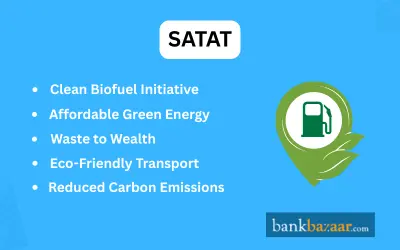SATAT – Sustainable Alternative Towards Affordable Transportation
What is SATAT?
SATAT (Sustainable Alternative Towards Affordable Transportation) is an initiative launched by the Government of India in October 2018, aimed at promoting the production and use of Compressed Bio-Gas (CBG) as a sustainable and eco-friendly alternative fuel.

The initiative is a joint effort by:
- Ministry of Petroleum and Natural Gas (MoPNG)
- Oil Marketing Companies (OMCs)
- Private entrepreneurs and startups
It supports the government's vision for a cleaner environment and increased use of renewable energy in transportation.
Objectives of the SATAT Initiative
- Reduce dependence on fossil fuels
- Improve waste management by utilizing agricultural residue, animal waste, and municipal solid waste
- Promote entrepreneurship and rural employment
- Lower carbon emissions and support climate action goals
How SATAT Works
Under the SATAT scheme, entrepreneurs set up CBG production plants, and Oil Marketing Companies (like IOCL, HPCL, and BPCL) agree to procure CBG through long-term agreements.
CBG Feedstock Sources:
- Agricultural waste
- Sugarcane press mud
- Cow dung
- Municipal solid waste
- Food waste
The gas is purified to match natural gas quality and can be used in:
- Vehicles (as CNG)
- Industrial applications
- Household energy solutions
Benefits of SATAT
Environmental Benefits:
- Reduces greenhouse gas emissions
- Manages agricultural and urban waste effectively
- Supports cleaner air in urban areas
Economic and Social Benefits:
- Boosts the rural economy through waste-to-wealth models
- Encourages self-employment and entrepreneurship
- Reduces import bills on crude oil
SATAT Business Opportunities
The SATAT initiative opens avenues for:
- Startups and MSMEs in the renewable energy sector
- Technology providers in biogas purification and compression
- Investors and financial institutions supporting sustainable development
Interested entrepreneurs can apply through Oil Marketing Companies’ portals to set up CBG plants and sign offtake agreements.
SATAT vs CNG: What's the Difference?
While CNG (Compressed Natural Gas) is a fossil fuel, CBG (Compressed Bio-Gas) under SATAT is derived from organic waste. It is a renewable, carbon-neutral fuel that matches the energy characteristics of CNG but with a smaller environmental footprint.
FAQs on SATAT
- Who can set up a CBG plant under SATAT?
Anyone – individuals, companies, cooperatives, or farmers – can apply to set up a CBG plant, subject to meeting guidelines and securing agreements with OMCs.
- Is there government funding or subsidy available?
Yes. Central and state governments offer various incentives under schemes like the Waste to Energy program and National Bio-Energy Mission.
- How is CBG transported and used?
CBG is compressed, bottled, and transported to dispensing stations or end-users, just like CNG

Disclaimer
Credit Card:
Credit Score:
Personal Loan:
Home Loan:
Fixed Deposit:
Copyright © 2026 BankBazaar.com.